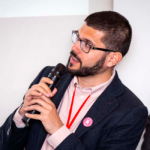


The Council of Ex-Muslims of Sri Lanka was founded in 2016 by a handful of brave activists. The only public figure of the organization is Rishvin Ismath, CEMSL’s Co-founder and present Spokesperson.
In November 2020, Humanists International expressed its deep concerns for the safety and well-being of Rishvin Ismath, who is currently facing serious threats against his life as a result of his non-belief and advocacy for humanist values.
The discrimination against humanist, atheists and the non-religious in general is very harsh in the country, as the case of Sri Lankan rationalist Shakthika Sathkumara testifies.
Members of CEMSL back in 2018, during their 2nd AGM. Faces are pixelated for security.
 After the General Assembly, the Council of Ex-Muslims of Sri Lanka released the following statement:
After the General Assembly, the Council of Ex-Muslims of Sri Lanka released the following statement:
“Annual General Meeting of Council of Ex-Muslims of Sri Lanka held in Colombo on 31st January 2021 with a limited number of participants due to the CoViD-19 pandemic. CEMSL presents the following resolutions:
- Parallel legal systems, including Khadi courts should be abolished. One legal system for all citizens should be implemented to its true value.
- Muslim Marriage and Divorce Act should be abolished. If there are any better clauses in MMDA, they should be adopted into the general law for the betterment of all Sri Lankans and outdated clauses should be completely abolished.
- Government should take the worries of Muslim community regarding the burial issue for consideration. A study should be done immediately to find the pros and cons of burying Covid 19 infected bodies and the correct solution to be provided.
- Religious and ethnic based segregation of the school system should be abolished.”
 Giovanni Gaetani, Membership Engagement Manager of Humanists International, commented the news:
Giovanni Gaetani, Membership Engagement Manager of Humanists International, commented the news:
“Humanists International is proud to support the Council of Ex-Muslims of Sri Lanka in their endeavour to make Sri Lanka a secular country, where universal human rights are respected and protected, and where states uphold secularism.
“Rishvin and his friends are an example to all humanists around the world. They show us what it means to be activists in those countries where atheism and apostasy are still considered morally (or legally) unacceptable.
“Once again, the message we want to send to our friends in Sri Lanka is: you are not alone, and we are here to help you.“